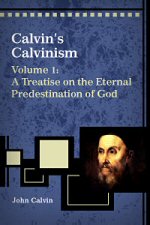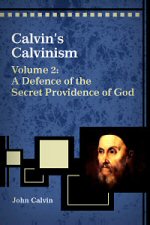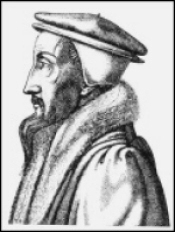Calvin’s Calvinism (2 vols.)
Digital Logos Edition
Overview
No theologian has been so widely acclaimed and assailed as John Calvin. His teachings have spawned movements and sparked controversy throughout the centuries. Wars have been fought both to defend and to destroy what has become known as Calvinism, a system of thought that Calvin’s followers used as a foundation for political and theological revolutions in Western Europe and America. The breadth and depth of the global engagement with Calvin’s works since they first appeared four centuries ago—and their continuous publication since then—testify to Calvin’s importance and lasting value for the church today.
This bundle contains a translated version of Calvin’s treatise on predestination, clearly outlining his teaching and defense of the sovereignty of God in predestination and providence, as well as 14 further articles regarding predestination.
The Logos edition of Calvin’s Calvinism contains extensive tagging and linking. All Scripture references appear on mouse-over, and each reference links to the original language texts and English Bible translations in your library. With Logos, you can perform comprehensive searches by topic or Scripture reference—finding, for example, every mention of “eternal predestination” or “providence.” That makes the Logos edition of Calvin’s Calvinism easily accessible for scholars and laity alike.

- Prefaces by the translator
- Replies from John Calvin on each article
- Index of Scripture references cited
. . . Calvin’s theology interests us in its historical context as an outstanding record of Reformation theology that historically—and at times even legally—has served as a basis of proclamation in modern Protestant churches.
Calvin helped the Reformation change the entire focus of the Christian life. Calvin’s teaching, preaching, and catechizing fostered growth in the relationship between believers and God.
—Joel R. Beeke
The fundamental issue for John Calvin—from the beginning of his life to the end—was the issue of the centrality and supremacy and majesty of the glory of God.
John Calvin is a man of distinguished reputation, one of the great figures of church history.
—Wulfert de Greef
It would hardly be too much to say that for the latter part of his lifetime and a century after his death John Calvin was the most influential man in the world, in the sense that his ideas were making more history than those of anyone else during that period. Calvin’s theology produced the Puritans in England, the Huguenots in France, the ‘Beggars’ in Holland, the Covenanters in Scotland, and the Pilgrim Fathers of New England, and was more or less directly responsible for the Scottish uprising, the revolt of the Netherlands, the French wars of religion, and the English Civil War. Also, it was Calvin’s doctrine of the state as a servant of God that established the ideal of constitutional representative government and led to the explicit acknowledgment of the rights and liberties of subjects. . . . It is doubtful whether any other theologian has ever played so significant a part in world history.
[Calvin] easily takes the lead among the systematic expounders of the Reformed system of Christian doctrine. . . Calvin’s theology is based upon a thorough knowledge of the Scriptures. He was the ablest exegete among the Reformers, and his commentaries rank among the very best of ancient and modern times. His theology, therefore, is biblical rather than scholastic, and has all the freshness of enthusiastic devotion to the truths of God’s Word. At the same time he was a consummate logician and dialectician. He had a rare power of clear, strong, convincing statement. He built up a body of doctrines which is called after him, and which obtained symbolical authority through some of the leading Reformed Confessions of Faith.
- Title: Calvin’s Calvinism
- Author: John Calvin
- Translator: Henry Cole
- Publisher: Wertheim and Macintosh
- Volumes: 2
- Pages: 340
This title is included in the following collections
You can save when you purchase this product as part of a collection.
Logos 7 Reformed Starter Legac...
$39.99$39.99Tracts and Treatises of John C...
$49.99$49.99Logos 7 Reformed Bronze Legacy...
$89.99$89.992025 Reformed Silver
$349.99$279.99
- $349.99
- $349.99
- $349.99
- $349.99
- $599.99
- $849.99$679.99
- $849.99
- $849.99
- $849.99
- $849.99
- $849.99
- $1,499.99$1,199.99
- $1,499.99
- $1,499.99
- $1,499.99
- $1,499.99
- $1,499.99
- $2,999.99$2,249.99
- $2,999.99
- $2,999.99
- $2,999.99
- $2,999.99
- $2,999.99
- $2,999.99
- $4,749.99$3,562.49
- $4,749.99
- $4,749.99
- $4,749.99
- $4,749.99
- $11,399.99
- $11,399.99
- $23,999.99$17,999.99
- $21,749.99
- $24,999.99

Calvin’s Calvinism, vol. 1
- Publication Date: 1856
- Pages: 192
For generations, the terms “Calvinist” and “Calvinism” have been used to bolster arguments and blame opponents. Henry Cole, the translator of this volume, laments the ways Calvin’s theology has been used by those who misunderstand him or, even worse, don’t read him. He notes that there are “almost as many different shades, phases, kinds, and degrees of Calvinism as there are Calvinists.” His translation of Calvin’s treatise on predestination encourages seekers to read and explore one of Calvinism’s most important doctrines—and to learn what Calvinism is from the founder himself.

Calvin’s Calvinism, vol. 2
- Publication Date: 1857
- Pages: 148
This volume contains Calvin’s treatise on the providence of God—a central component of Calvinism—first published in Geneva in 1558 and translated into English in 1857. In volume 2 of Calvin’s Calvinism, Henry Cole clarifies confusion about this aspect of Calvinist doctrine by allowing Calvin to speak in this fresh translation.

John Calvin (1509–1564) was a theologian, pastor, biblical exegete, and tireless apologist for Reformed Christianity. He ranks among the most important thinkers in church history. His theological works, biblical commentaries, tracts, treatises, sermons, and letters helped establish the Reformation as a legitimate and thriving religious movement throughout Europe.
John Calvin was born on July 10, 1509 in Noyan, France. He began his work in the church at the age of 12, intending—at the request of his father—to train for the priesthood. Calvin attended the Collège de la Marche in Paris, before studying law at the University of Orléans in 1526 and continuing his studies at the University of Bourges. In 1532, Calvin’s first published work appeared: a commentary on Seneca’s De Clementia.
One year later, he befriended Nicolas Cop, rector of the Collège Royal in Paris. This friendship resulted in trouble for Calvin when Cop, after calling for reform in the Catholic Church, was branded a heretic. Cop fled to Basel, and Calvin was forced from Paris. The controversy expanded when, on the evening of October 18, 1534, anonymous attacks against the Mass were posted on public buildings, fueling the violence in the city. Calvin left France for Basel in January. The controversy, and the trouble it caused Calvin, disciplined him in his writing project, and he began working on the first edition of The Institutes of the Christian Religion, which appeared in 1536.
In June 1536, Calvin returned to Paris as the violence subsided, but he was expelled again in August of 1536. He left for Strasbourg, but was forced to Geneva instead, where he stayed at the request of William Farel. He became a reader in the church in 1537. In late 1537, Calvin fled Geneva after a controversy surrounding the Eucharist. He traveled to Basel before accepting a position at the church in Strasbourg. There, Calvin continued working on both the second edition of the Institutes and his Commentary on Romans. At the urging of his friends, Calvin married Idelette de Bure. He returned to Geneva in 1541.
Upon his arrival to Geneva, Calvin began writing prolifically. He continued his revisions to the Institutes, preached weekly, taught the Bible during the week, and delivered lectures on theology. Calvin also continued work on his New Testament commentaries.
His return to Geneva was not without controversy, however. He faced opposition from the libertines, who, in 1552, compromised his authority and nearly succeeded in banishing him from Geneva a second time. His greatest threat, however, came from his theological antagonist, Servetus. The frequent letters between Calvin and Servetus contain elements of their tenuous relationship, which was worsened when Servetus visited Geneva against Calvin’s orders, publically denied the Trinity, and disgraced the church. He was condemned for heresy and executed.
By 1553, Calvin was praised for his work in uniting Geneva and securing the Reformation’s future. The church housed refugees from England—among them John Knox—who brought the Reformed faith to England. Calvin also sent more than 100 Reformed missionaries to France, and he frequently corresponded with both political leaders and second generation Reformers throughout Europe. He founded a school in Geneva, and Theodore Beza became its first rector. Calvin’s influence quickly expanded beyond the vicinity of Geneva.
During the 1550s, Calvin’s health began to decline, prompting him to undertake a final revision and expansion of The Institutes of the Christian Religion. Published in 1559, it was immediately reprinted and translated throughout Europe.
Calvin became ill in early 1564, and he preached his last sermon on February 6 of that same year. His health worsened throughout the spring, and he died on May 27. Thousands flocked to view his body, forcing the council in Geneva to bury him in an unmarked grave.
Reviews
38 ratings
A Reformed
6/3/2022
Manuel Fernández Martín
6/24/2019
JS
8/16/2018

Debi Krichbaum
4/15/2018

Dennis Smith
1/23/2018
Antonio Burgos
12/10/2017

Ivan Cen
11/8/2017

Ariel Isaac Alvarenga de Góes
8/23/2017
edwin lam
2/10/2017

Pat Thomas Sr
12/19/2016